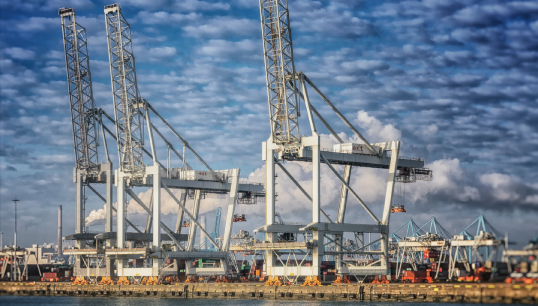- Topics
- Campaigning
- Careers
- Colleges
- Community
- Education and training
- Environment
- Equality
- Federation
- General secretary message
- Government
- Health and safety
- History
- Industrial
- International
- Law
- Members at work
- Nautilus news
- Nautilus partnerships
- Netherlands
- Open days
- Opinion
- Organising
- Podcasts from Nautilus
- Sponsored content
- Switzerland
- Technology
- Ukraine
- United Kingdom
- Welfare

The European Transport Workers' Federation is demanding an end to a loophole in EU competition law that benefits shipowners at the expense of maritime workers, writes Berardina Tommasi
The Consortia Block Exemption Regulation (CBER) is an exemption from EU antitrust rules that allows some shipping lines to share vessel capacity and coordinate sailing schedules. The aim was to help shipowners adapt to demand fluctuation, but it has resulted in them having an ever-more dominant position over terminal operators and other actors in the supply chain.

Berardina Tommasi is the ETF policy officer for dockers
The CBER is detrimental to seafarers because it allows employers to team up and set their procedures as a group. Companies do not therefore need to compete to attract workers on more favourable terms and conditions than their rivals.
In the ports, dockworkers suffer because the powerful shipowners exert pressure as a group to have things done how they want, when they want. Schedules for seafarers and dockworkers alike see more unpredictability and stressful peaks of activity.
The ETF is fighting for these workers' rights in a context where European and global shipping has become more and more powerful over the years, due to economies of scale, maritime subsidies and, more recently, to the effects of Covid-19 and the massive disruptions to the global maritime supply chain.
Sea miles being equal, the rates for transferring a container from East Asia to Europe have increased by 600% over the last few years, and the shipping lines' net profits rose by 50% in 2021. Shipping companies are rich and successful. They do not need an antitrust loophole like the CBER, which has served shipowners to the detriment of workers, consumers, and taxpayers.
The lethal mix of this exemption and maritime subsidies allows the consortia to act as if they were the only players in the maritime industry and use these advantages as leverage to massively increase their profits.
The role of the European Commission in the EU should be to guarantee a level playing field, but the CBER has turned out to be a disproportionate advantage that has caused harm to the workers and the principle of fair competition in the sector.
Ensuring a socially sustainable sector should be an EU priority; therefore, it’s time to put an end to the CBER.
Tags
